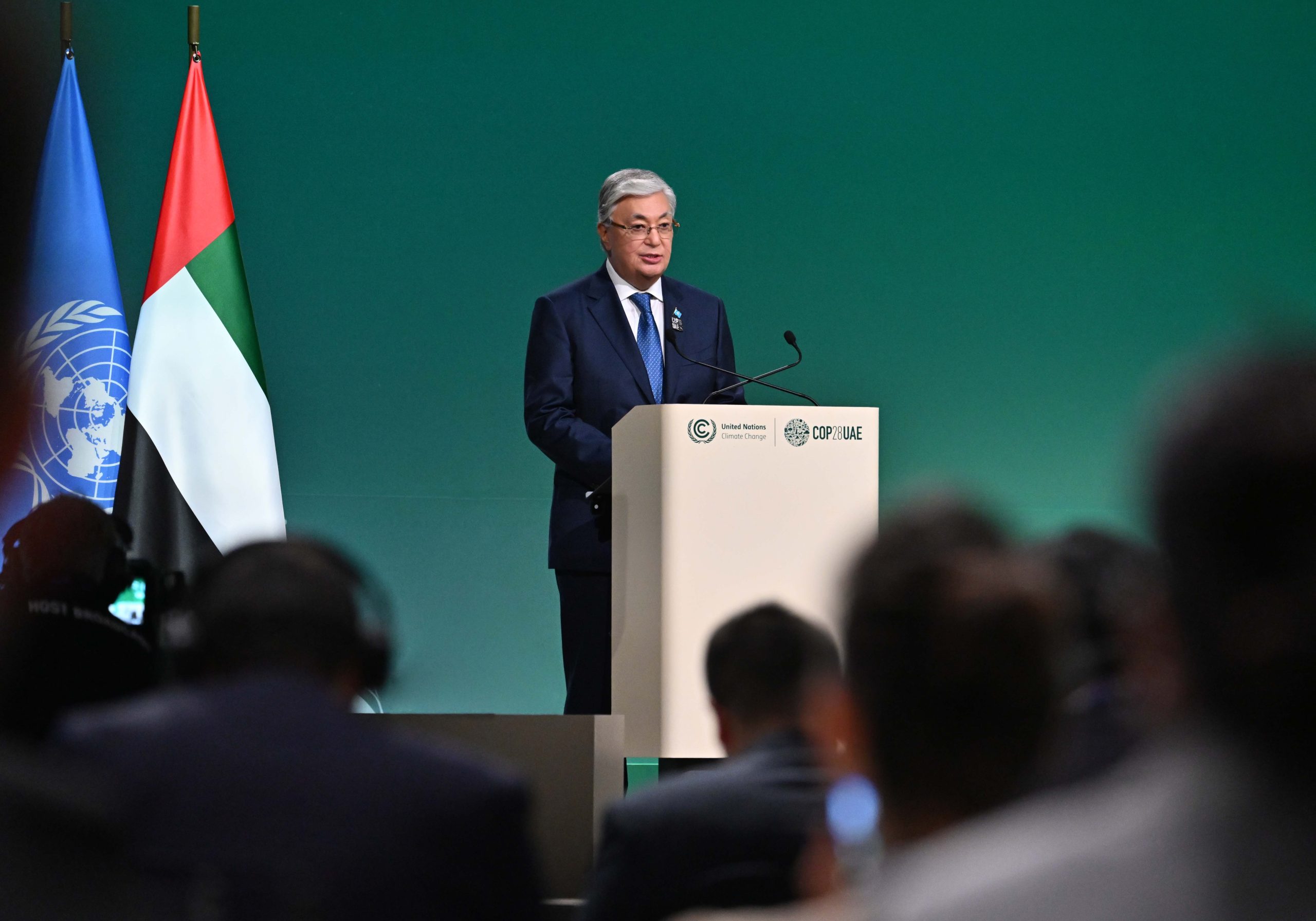An ambitious initiative unveiled by Kazakhstan’s President Kassym-Jomart Tokayev at the Twenty-eighth Conference of Parties (COP28) to the United Nations Framework Convention on Climate Change (UNFCCC) in Dubai has the potential to significantly shape the global energy landscape. This initiative – namely the Joint Energy Transition Partnership (JETP) for Kazakhstan – is not just a domestic energy policy but a strategic manoeuvre of international policy and energy security.
Known for its oil and gas reserves, Kazakhstan has historically been a major petrochemical producer. The JETP for Kazakhstan, however, will further position the country as a key player in the global transition to renewable energy sources. “As the world decarbonises,” Tokayev explained at COP28, “critical minerals will become irreplaceable in the coming decades. Kazakhstan is ready to become the main supplier of these transition minerals.” Globally, Kazakhstan ranks first in terms of the total reserves and quality of chrome ores, second in terms of reserves and resources of uranium and silver, and third in terms of reserves of lead and proven reserves of manganese ore.
As announced by President Tokayev, the JETP is a comprehensive framework that encompasses several key goals including increasing Kazakhstan’s production and export of critical minerals, investing in renewable energy technologies, and co-operating with international partners to develop new supply chains.
Kazakhstan’s JETP highlights common elements with other similar global initiatives but also boasts unique features to Kazakhstan. For instance, like the European Union’s (EU) Green Deal, JETP also emphasises sustainability and economic growth. The initiative compares well with global standards set by organisations such as the International Renewable Energy Agency (IRENA), as well as with the Sustainable Development Goals (SDGs) established by the United Nations (UN). Kazakhstan’s approach thus mirrors global trends while emphasising sustainability, economic diversification and international co-operation.
On the other hand, amongst all other national JETPs recently adopted or under consideration, Kazakhstan’s initiative stands out for its particular focus on the supply of critical minerals that are crucial for energy transition’s renewable technologies. Kazakhstan has substantial resources of all the above-mentioned critical minerals, in addition to uranium, an increasingly important element for the global energy industry’s switch to nuclear power as a renewable technology included in the energy transition.
The emphasis on critical minerals thus places Kazakhstan in a unique position as a leading potential supplier in the renewable energy value chain. Indeed, President Tokayev in his keynote address at COP28 reiterated Kazakhstan’s status as the world’s top exporter of uranium, which will help the country play a key role in global electricity production without carbon waste.
Specifically, these critical minerals include lithium, cobalt and nickel (all of which are necessary for the production of electric batteries); rare earths, which include a group of 17 elements like neodymium, dysprosium and terbium (crucial for manufacturing permanent magnets used in wind turbines and electric vehicle motors); and silver, which plays a critical role in solar panel manufacturing due to its excellent electrical conductivity.
To demonstrate the country’s significant production, take into consideration that amongst the 18 critical minerals officially identified by the United Kingdom, Kazakhstan is already producing eight, and plans to launch projects for processing four others (cobalt, lithium, tin and tungsten) in the medium term.
The JETP initiative, by leveraging these critical resources, not only aligns Kazakhstan’s growth strategy with global efforts towards sustainable development but also positions the country as a leader in the renewable energy transition, bridging the gap between traditional energy resources and the future of green technology.
The initiatives in the energy sector fit in with Kazakhstan’s role to tackling the greater climate crisis. In his COP28 keynote address, President Tokayev emphasised his country’s strong commitment to addressing global climate concerns. He also highlighted the impact of the current geopolitical instability and energy security issues on climate change. Specifically, he reminded his audience of his country’s support for the UN goal of meaningful environmental protection and mentioned Kazakhstan’s ratification of the Paris Agreement. Along with the nation’s plan to achieve carbon neutrality by 2060, the adoption of Kazakhstan’s new Ecological Code was noted for encouraging the widespread use of “green” technologies across various sectors of the national economy.
President Tokayev also signalled Kazakhstan’s significant potential for utilising wind and solar energy, as well as producing green hydrogen. Additionally, he highlighted Kazakhstan’s commitment to the Global Methane Pledge, demonstrating its dedication to tackling one of the most potent greenhouse gases contributing to climate change. This pledge aims to reduce methane emissions by at least 30% by 2030 compared to 2020 levels.
Demonstrating a crucial understanding of the interconnectedness between climate goals and economic advancement, President Tokayev further insisted upon the importance of a balanced approach that integrates climate protection with national development. It is unfair, he stressed, to demand that emerging economies sacrifice national development and modernisation in the name of climate protection.
In summary, President Tokayev’s announcement of Kazakhstan’s JETP at COP28 deserves recognition as a major contribution to addressing climate change by enhancing the global green supply chains. This initiative not only underscores Kazakhstan’s shift from traditional energy sources to renewable energy but also positions the nation as a central player in the global energy transition.


















































